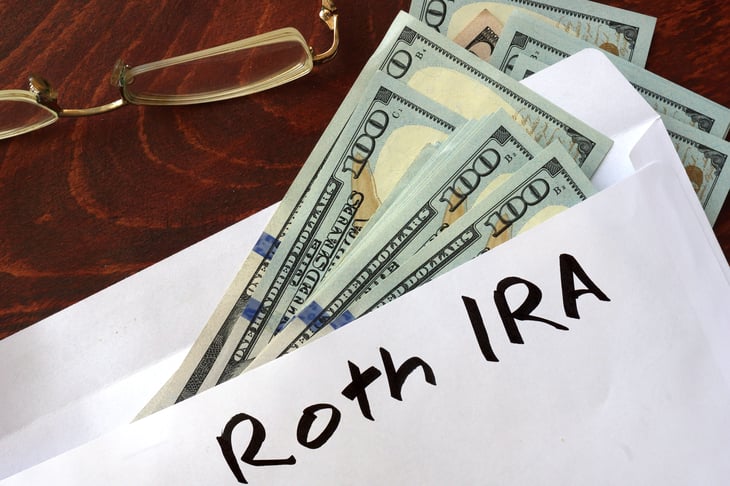
Retirement is the time to enjoy the fruits of many years of laboring away at a job.
However, if you aren’t careful, Uncle Sam can reach in and pluck away your hard-earned savings bit by bit, year after year.
When the tax man comes during your working years, it’s annoying. But it’s even worse during your golden years, when you no longer have a full-time income and every penny counts.
Fortunately, you can take steps to keep the government at bay. Following are several ways to trim your tax bill during retirement.
1. Convert to a Roth IRA — carefully

Once you reach the age of 73, old Uncle Sam will come a-knockin’ and demand that you start making annual withdrawals from traditional retirement accounts, including 401(k) plans and individual retirement accounts.
And when you make those mandatory withdrawals — which are known as required minimum distributions, or RMDs — you will owe taxes on them.
One way to minimize the tax bite is to plan ahead.
Long before you reach your 70s, slowly convert portions of your traditional retirement funds over to a Roth IRA, which is not subject to RMDs. This strategy especially makes sense in certain situations, such as if you retire early and expect your income to be lower for several years.
For example, if you plan to live off a mountain of savings that you have built up in a bank account — and if you will have few sources of regular income during that time — you might end up in a low tax bracket. Move money from tax-deferred accounts into a Roth IRA during such a period, and you will only have to pay taxes at that low rate. The money will then grow tax-free and future gains will be tax-exempt when withdrawn.
Admittedly, this strategy will not be feasible for all people. But it can be a sound strategy for some.
Before considering it, though, make sure to talk to a qualified tax professional or financial advisor. If you’re unsure where to start or already know that you want a fiduciary — an advisor who is required to act in your best interest — consider checking out SmartAsset, a free service that connects you with vetted fiduciary advisors in your area.
2. Give to charity

Yes, changes from the 2017 federal tax code overhaul made it less attractive to contribute to charity, at least in terms of getting a tax break.
However, a big tax break remains for retirees who want to donate to the charity of their choice. You can use the money you must withdraw for any required minimum distribution tied to an IRA or 401(k) and give it to a good cause.
As we detail in “5 Ways to Avoid Taxes on Social Security Income“:
“If you are at least 70½, you can take up to $100,000 of your annual required minimum distribution, give it to a charity and avoid income taxes on the money. This is known as a qualified charitable distribution.”
3. Take advantage of favorable capital gains rates

When your income is low, so is your capital gains tax rate. In fact, it’s positively subterranean.
You will not pay any capital gains taxes on investment gains held for more than one year if your income falls below certain levels. If your income is a little higher, you may pay a rate of 15% or 20% in most cases.
So it can make sense to sell stocks and other long-term investments when your income is lower. However, it also is foolish to sell stocks simply to get a tax break. Weigh other factors before making this move — and consider consulting a financial pro to get some advice.
4. Delay claiming Social Security

It hardly seems fair: After years of paying extra taxes that contribute to the Social Security benefits of your fellow citizens, it’s possible you could be taxed on your own Social Security benefits in retirement. That’s what happens if you earn too much of what the Social Security Administration calls your “combined income.”
There are several ways to avoid this fate, but perhaps the easiest is to simply delay claiming your Social Security benefits. In fact, if you wait until you are 70, you can significantly boost the size of your monthly Social Security payment as well since the benefits increase each year you delay up to that age.
However, before you deploy this strategy, know that it doesn’t always make sense. Money Talks News founder Stacy Johnson breaks down the pros and cons in “Should We Take Social Security at 62, 66 or 70?.”
5. Keep the right mix of investments

One of the most overlooked ways to save on taxes during retirement — or any other age — is to make sure you keep the right mix of investments in your taxable and nontaxable accounts.
With this strategy, you keep more tax-efficient investments — such as stocks, many types of mutual funds and ETFs, and municipal bonds– in your taxable accounts. Less tax-efficient investments — many types of bonds, CDs, real estate investment trusts — should be held in tax-deferred and tax-free accounts.
Those who thoroughly understand this concept can create the right mix on their own. For many of the rest of us, it is best to turn to the help of a professional. Stop by the Solutions Center and find a great financial advisor.
6. Withdraw money wisely

Eventually, you probably will have to withdraw the money you have been saving for retirement. Doing so in the right way can provide a boost to your bottom line.
In 2020, Morningstar researchers ran the numbers and discovered that simply withdrawing funds from your accounts in the most tax-efficient manner can boost your income in retirement by 4%.
That means that if you withdraw $50,000 every year, you can boost your take by an extra $2,000.
Once again, executing this strategy correctly is not always easy. As a general rule, many experts suggest withdrawing from taxable accounts, tax-deferred accounts and tax-free accounts in that order. However, your individual circumstances will determine if this is the right approach.
So, seeking the help of a financial advisor is likely a shrewd move if you are in this situation.
7. Stay frugal

Another common-sense way to lower your tax bill is simply to keep your expenses down. It’s true that once you turn 73, you will be forced to make minimum required distributions from traditional retirement accounts. But you are only required by law to withdraw that minimum and not a dime more.
However, if you spend too much in retirement, you may be forced to dip more deeply into those accounts. That could push up your tax bill.
So if you’ve spent years being smart with your money, don’t turn dumb now that the ballgame has entered the late innings. Stay the frugal course, and you will reap the tax benefits.





Add a Comment
Our Policy: We welcome relevant and respectful comments in order to foster healthy and informative discussions. All other comments may be removed. Comments with links are automatically held for moderation.